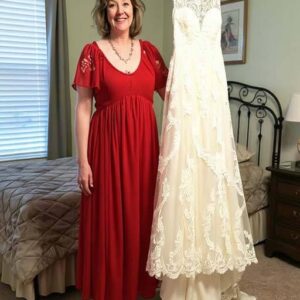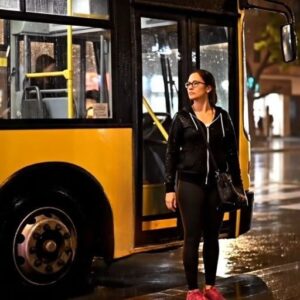They erased my name from the wall of heroes because they said old men can’t remember clearly. Fifty years after I pulled three Marines from a burning helicopter in Vietnam, the new museum director decided my Medal of Honor story “lacked sufficient documentation.” I was just another senile old biker making up war stories, they said. But they didn’t know who they were messing with, or what I was willing to do to protect the truth.
I found out during the Veterans Day ceremony. There I was, 76 years old, leather vest still fitting despite the extra pounds, sitting among the other vets while some 30-year-old historian with a bow tie gave a speech about “verifying narratives” and “historical accuracy.” My granddaughter Emma nudged me when he mentioned the “revised display.”
“We’ve removed several unverifiable accounts,” Bow Tie announced proudly. “Including the alleged rescue attributed to Sergeant Frank Miller.”
Alleged? My hands gripped the armrests until my knuckles turned white. The rescue that cost me half my hearing and the burns that still snaked up my right arm—alleged?
I stood up, ignoring Emma’s whispered plea to sit down. “That’s a damn lie,” I said, my voice carrying across the silent room. “I was there. I have the medal to prove it.”
Bow Tie gave me that look—the one young folks give old men when they think we’re confused.
“I’m sorry, sir, but the committee has determined there’s insufficient evidence,” he said with rehearsed patience. “Perhaps you’re misremembering the details.”
That’s when I knew this fight was just beginning. That’s when I decided they wouldn’t erase me so easily.
The first thing they take from old men is our credibility. Before they come for our licenses, our independence, our dignity—they start by treating our memories like swiss cheese, full of holes and not to be trusted.
My name is Frank Miller. Sergeant, United States Marine Corps, 1968-1972. Medal of Honor recipient for the actions I took on May 2, 1969, outside Khe Sanh. Not that it seemed to matter anymore.
“Grandpa, please calm down,” Emma said as she drove me home from the ceremony. She was a good kid—smart as a whip at 22, studying history at the state university. “There has to be a reasonable explanation.”
“The explanation is they think I’m a senile old man,” I said, staring out the window at the town I’d called home for forty years. “They’re erasing me, Emma. Erasing what I did.”
“We’ll figure it out,” she promised, squeezing my hand.
But I knew how these things went. Once they decided your story didn’t fit their narrative, good luck changing their minds.
When Emma dropped me off, my neighbor Ted was outside working on his Softail. We’d been riding buddies for almost twenty years, two Vietnam vets who found peace on the open road. He took one look at my face and knew something was wrong.
“They took my name off the wall,” I told him after explaining what happened. “Fifty years of honor, gone because some academic decided my story wasn’t good enough.”
Ted wiped his greasy hands on a rag. At 74, his hands weren’t as steady as they used to be, but they still knew their way around a motorcycle engine. “That’s a load of crap, Frank. Who’s this director? What’s his name?”
“Dr. Andrew Peterson.” The name tasted bitter in my mouth. “Been here six months. Came from some fancy university out east.”
“Well, Dr. Peterson needs to learn some respect,” Ted said, throwing the rag down. “What are you going to do?”
I looked at my Indian Scout sitting in the driveway, still my faithful companion after all these years. “I’m going to fight.”
The next morning, I put on my dress uniform. It was tighter than it used to be, but the ribbons and the Medal of Honor still sat perfectly on my chest. I’d cared for that uniform like it was a sacred text, which to me, it was.
The Lakeside Military Museum was quiet on a Tuesday morning. I walked through the front doors with my head high, asking to see Dr. Peterson. The young woman at the front desk looked uncomfortable when she saw my uniform and the determination on my face.
“Do you have an appointment, sir?” she asked.
“Fifty years of service is my appointment,” I replied. “Please tell him Sergeant Frank Miller is here.”
I waited ten minutes before Peterson emerged from his office. He was younger than I’d expected, maybe 35, with a carefully trimmed beard and glasses that looked more expensive than my first motorcycle.
“Mr. Miller,” he said, extending his hand. “I anticipated we might hear from you. Would you like to come into my office?”
His office was filled with books and artifacts behind glass cases. No dust anywhere. No sense that any of these items had been touched or used or loved. Just preserved and cataloged.
“I want to know why you removed my name,” I said, refusing his offer to sit. “I earned that spot on the wall.”
Peterson sighed, as if explaining something to a child. “Mr. Miller, when I took this position, I promised the board I would ensure everything in this museum met the highest standards of historical verification. Your… story… lacks contemporary documentation.”
“My story? You mean the one confirmed by the United States government when they gave me this?” I touched the medal on my chest. “The one witnessed by the three men I pulled out of that helicopter?”
“Yes, well.” He shuffled some papers on his desk. “The problem is, those men are all deceased. The official report from that day mentions a rescue but doesn’t specifically name you. And there are some… inconsistencies… in the accounts you’ve given over the years.”
“What inconsistencies?”
He pulled out a folder. “In 1989, you told the local paper the helicopter was shot down. In 1995, you said it crashed due to mechanical failure. In 2007, you mentioned it was hit by mortar fire.” He looked up at me. “Do you see the problem?”
I felt heat rising in my neck. “The problem is you weren’t there. When you’re pulling men from burning wreckage, you don’t stop to ask what caused the crash.”
“Mr. Miller, I respect your service,” he said in a tone that suggested the opposite. “But this museum cannot present stories without proper documentation. Perhaps if you had photographs, or letters written at the time, or—”
“It was a war zone, not a photo op,” I snapped. “We were too busy staying alive to document every moment for future museum directors.”
Peterson stood, signaling our meeting was over. “I’m sorry you’re upset. But the decision stands unless new evidence comes to light.”
As I left his office, fury and helplessness battled inside me. This wasn’t just about a name on a wall. It was about my legacy, my truth. Without it, what was left?
Outside, I sat on a bench trying to calm down. My heart was racing, and my doctor had warned me about stress. I pulled out my phone and called Emma.
“How did it go?” she asked immediately.
“Exactly as I expected. He thinks I’m confused about what happened because I’ve described it differently over the years.” I rubbed my forehead. “He wants documentation, Emma. From a jungle in 1969.”
She was quiet for a moment. “Grandpa, don’t give up. There has to be something. What about military archives? Or maybe there are records we haven’t thought of.”
“At my age, kid, being told your memories aren’t real feels like being erased while you’re still breathing.”
“I know,” she said softly. “But your story matters. And we’re going to make them remember it.”
That night, I couldn’t sleep. I got up around 2 AM and went to the garage where I kept my old footlocker. I hadn’t opened it in years—too many ghosts inside. But now I needed those ghosts.
Under the dim light, I sifted through faded photographs, old letters, my discharge papers. Nothing that would specifically prove I was the one who pulled those men from the helicopter. In the bottom corner was a small box containing the Purple Heart I’d received for the burns. At least that was documented.
As I was about to close the locker, my fingers touched something metallic tucked into the lining. A small key. I stared at it, suddenly remembering. After the war, I’d kept a safety deposit box at First National Bank. I hadn’t opened it in decades, had almost forgotten its existence.
The next morning, I rode my Indian to the bank. The building had changed names three times since I’d last visited, but the vault was still there. They had to search through old records to find my box, and I had to prove my identity six different ways, but eventually, a young bank officer led me to a private room with a long metal box.
My hands shook slightly as I inserted the key. Inside were papers yellowed with age: my original orders, some letters I’d written home but never sent, and a small leather journal I’d kept sporadically during my tour.
I paged through the journal, heart pounding when I reached May 1969. There it was—a brief entry dated May 3: “Helicopter down yesterday. Burns on arms. Carson, Williams, Jenkins made it out. Evac to field hospital.”
Not much, but it was something. As I continued looking through the box, I found something else: a creased black and white photograph. It showed me in a field hospital bed, arms bandaged, surrounded by three men in hospital gowns—Carson, Williams, and Jenkins. On the back, in faded pen: “The men you saved want a picture with their hero. May 5, 1969.”
I held the photo carefully, remembering the moment it was taken. Williams had smuggled in a camera. Carson could barely stand. Jenkins had lost an eye. But they were alive.
I called Emma immediately. “I found something,” I said. “It’s not much, but it’s a start.”
“That’s great, Grandpa! I’ve been doing some research too. Did you know the National Archives has been digitizing Vietnam War records? And I’ve been talking to some of my professors about how we might be able to authenticate your story.”
For the first time since the ceremony, I felt hope. But I also knew Peterson’s type—he’d find a way to dismiss this evidence too. We needed more.
Emma suggested we meet with her history professor, Dr. Santos, who specialized in military history. She’d already told him my story, and he was interested in helping. We arranged to meet at a coffee shop near the university the following day.
Dr. Santos was nothing like Peterson. In his sixties with a salt-and-pepper beard and worn jeans, he reminded me of the college professors who’d taught night classes on the GI Bill when I came home.
“Sergeant Miller,” he said, shaking my hand firmly. “It’s an honor. Emma’s told me what happened. I’d like to help, if you’ll let me.”
I showed him the journal and the photograph. He examined them carefully.
“These are significant,” he said. “Especially the photograph. But Peterson’s right about one thing—we need more documentation to make an irrefutable case.” He looked up at me. “Tell me, did you ever receive any correspondence from the men you saved?”
I shook my head. “Not directly. After the war, I just wanted to forget. We all did.”
“What about their families? Did you ever reach out?”
“No. I didn’t think…” I trailed off, feeling a pang of regret.
Dr. Santos nodded thoughtfully. “Here’s what I suggest. With your permission, I’d like to try tracking down the families of these men. Carson, Williams, and Jenkins, correct? If they told their families about you, there might be letters, diaries, something that corroborates your story.”
“After fifty years?” I asked skeptically.
“Families of veterans often preserve these memories,” he said. “It’s worth trying. And meanwhile, Emma and I can request your full military records through official channels. As a recognized historian, I might have better luck than you would as an individual.”
For the next two weeks, Emma and Dr. Santos worked tirelessly. I tried to help, but mostly I just waited, alternating between hope and despair. The others from my unit were mostly gone now—time had taken them as surely as the war had taken our youth.
I kept riding my Indian, finding peace on the open road that eluded me elsewhere. Sometimes Ted joined me, and we’d stop at diners where no one asked about medals or memories. Just two old bikers enjoying the freedom of the highway.
Then, one evening, Emma called, her voice vibrating with excitement.
“Grandpa, we found William Jenkins’ son! He lives in Ohio. And he has letters—letters his father wrote home mentioning you by name and what you did!”
My heart raced. “Are you serious?”
“Yes! And Dr. Santos found something else. When they processed your Medal of Honor, there was a witness statement from a Lieutenant Colonel Harrison. It was misfiled in the archives, but it explicitly names you and describes the rescue.”
For a moment, I couldn’t speak. All these years later, the past was reaching out, confirming what I’d always known to be true.
“There’s one more thing,” Emma continued. “Jenkins’ son said his father kept a diary during his recovery. He mentioned you several times. He’s scanning the pages and sending them to us.”
The evidence mounted over the next few days. Dr. Santos retrieved the misfiled witness statement. Jenkins’ son sent not only the diary entries but also a letter his father had written specifically about me: “If it wasn’t for Miller running into that fire, I wouldn’t be writing this letter now.”
Carson’s daughter, tracked down through a veterans’ group, had a similar story—her father had told the tale of his rescue at every Thanksgiving dinner until his death in 2007.
Emma compiled everything into a meticulous report, complete with photographs, scanned documents, and statements from military historians confirming the authenticity of the materials.
A week later, we returned to the museum. This time, Peterson couldn’t dismiss us so easily. Emma laid out the evidence piece by piece, her voice steady and professional.
“As you can see, Dr. Peterson, there is ample documentation supporting my grandfather’s account. Multiple independent sources confirm his role in the rescue, and the recently discovered witness statement from Lieutenant Colonel Harrison removes any reasonable doubt.”
Peterson examined the documents, his expression unreadable. “This is… certainly compelling,” he admitted reluctantly. “I’ll need to review everything thoroughly, of course.”
“Of course,” Emma agreed. “And while you’re reviewing, you might also want to see this.” She pulled out a final document—a letter signed by three military historians, including Dr. Santos, criticizing the museum’s “rushed and academically unsound” decision to remove the account.
Peterson’s face tightened. “Are you threatening me, Miss Miller?”
“Not at all,” she replied calmly. “Just providing context for your review.”
I watched my granddaughter with swelling pride. She fought for the truth with weapons I never had—education, research skills, and a determination that matched my own.
Three days later, Peterson called. The board had reviewed the new evidence, he said stiffly, and had decided to reinstate my story in the museum display. Furthermore, they would be creating a special exhibition about the process of historical verification, using my case as an example.
“We believe it will be educational for visitors to understand how historians work to confirm accounts, especially from combat situations where documentation may be challenging,” he explained, as if it had been his idea all along.
I knew what he was doing—saving face, turning his mistake into a teaching moment. But I didn’t care. My story would be told. My name would remain on that wall.
The day they unveiled the new display, the museum was packed. Word had spread about the controversy. Veterans groups had mobilized, many arriving on motorcycles that filled the parking lot. Ted organized an honor guard of Vietnam veterans on bikes to escort me to the ceremony.
The new display was everything I could have hoped for. My photograph alongside the three men I’d saved. The journal entry. The letters. And most importantly, the truth—not sanitized, not questioned, but honored.
After the ceremony, a young boy approached me, staring at the Medal of Honor on my chest.
“Did you really save those men, sir?” he asked, eyes wide.
“I did,” I said, my voice steady and sure. “And now nobody can erase that.”
As I walked out of the museum, surrounded by fellow veterans and family, I caught sight of my reflection in the glass display case. An old man in a leather vest, weathered by time but still standing tall.
They had tried to erase me—to dismiss my memories as the confused ramblings of an elderly man. But they learned what many before them had discovered: old bikers don’t go down without a fight. Our memories may fade, our joints may ache, but our truths remain.




